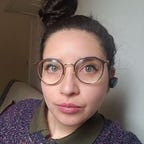I just finished my first semester of grad school. Here’s what I learned about building communities.
Before enrolling in my graduate program I was already interested in building communities, but after my first semester of #SocialJournalism at the Craig Newmark Graduate School of Journalism I understood how important it is and I just love it.
To tell you the truth what I am really interested in is the future of journalism. The way I see it, how we shape the journalism bussiness — meaning how news is told, how we understand the service we give, how newsrooms are formed, how we integrate technology and most importantly, how we collaborate with our communities — will impact greatly in our society and democracy in the future. This is why a program like #SocialJournalism is important ; it’s by improving our relationship with readers now that we can build a better future for the whole industry and for our society. This is one of the most important things I learn in this semester.
I thought I knew this before enrolling but I really understood what it meant while working in my community. While really talking and listening to them for months and making dozens of interviews. We had to choose the communities we wanted to engaged with and I chose the feminist community in Mexico City – in this post I explained why.
I need to be transparent and say that this is cause close to me. So I thought I was already part of this movement, but after talking to almost 20 people that included mothers of victims of femicides, victims of sexual harassment, radical feminists, activists, journalists, lawyers and others, I realized there was so much more than I could see.
There are so many nuances, there are so many different issues — all important at the same level.
Thanks to the mentorship of my professors Carrie Brown and Jeff Jarvis I could be more open about the questions I wanted to do and even ask one or two clever ones. I had great conversations and I could come up with some ideas to help my community or at least a part of it.
All the resources we had over the course were pretty useful and they all guided me to shape my mindset, the conversations I wanted to have and the solutions I wanted to search. They also made clear the obstacles there are in every underserved community, both in English and in Spanish. We talked to experts such as Jay Rosen and Eve Pearlman, professors like Dr. Alexandra Moffett-Bateau and amazing journalists like Jesenia De Moya, Allen Arthur, Maritza Félix and Andrew Losowsky.
We talked about objectivity — how it has been used in legacy newsrooms and by whom, about the revolutionary act of listening, about extractive journalism (and how bad it is), about the possibilities of design thinking in journalism, about solutions journalism, about disruptive media, audiences, engagement, nuances and so much more.
I also got the opportunity to work in Electionland, and even from afar, taste a little of what’s around the American election. I did fact-checking and learned to use new tools.
I applied all this information when talking to different people in my community. I also asked them their thoughts on how the media industry was serving them. I wanted to learn about their habits of information consumption, how they felt reporters were doing their job, if they felt supported by them, if they trusted the media and I received very different responses from “we’re really far from a better future with media” to “I don’t want them to get killed.”
I got many insights, but one that had an impact in me was how little they trust in the media. And I don’t blame them. Regarding femicides, the media has done horrible things: has disrespected families, victims and has made money with the body of mutilated women. And there have been other ones who don’t go that far but still blame the victim or have replicated misogynist perspectives.
But something changed in the last few years. Reporters are caring a little bit more, they are talking to the families, they are helping out. More people are listening and reading about “the feminists" issue. Authorities are asking opinion to the victims or their families. Could it be that there’s an awakening moment where we are understanding the importance of community building?
I love my program and I wish everybody could take the time to understand how relevant community building is. How crucial it is to the future of journalism. But also, I wish next time I talk about this, I’m just talking about journalism and not engagement journalism because all journalists are using the same techniques, are caring about their communities and maybe underserved groups are not that underserved…. one can dream, right?
